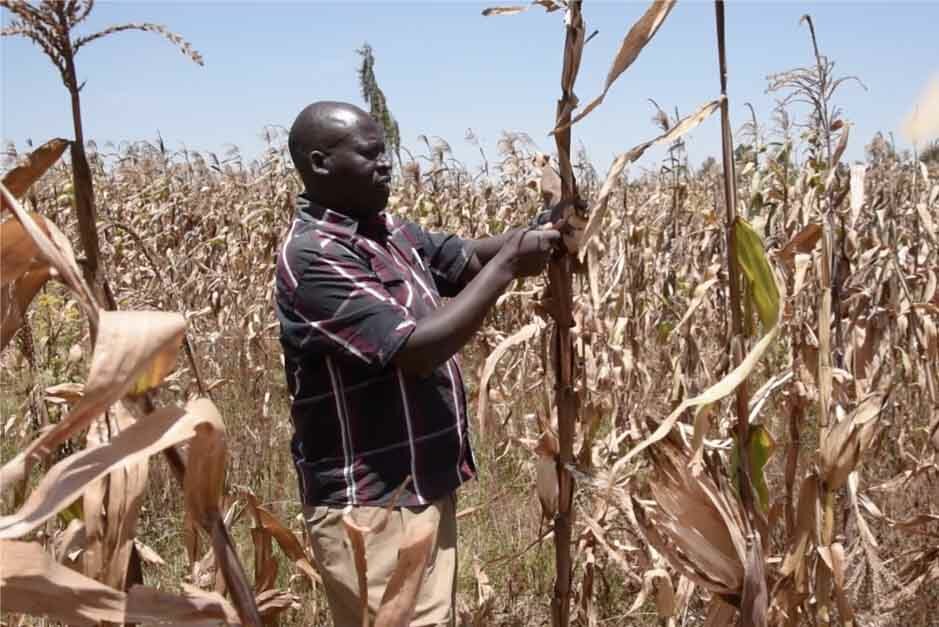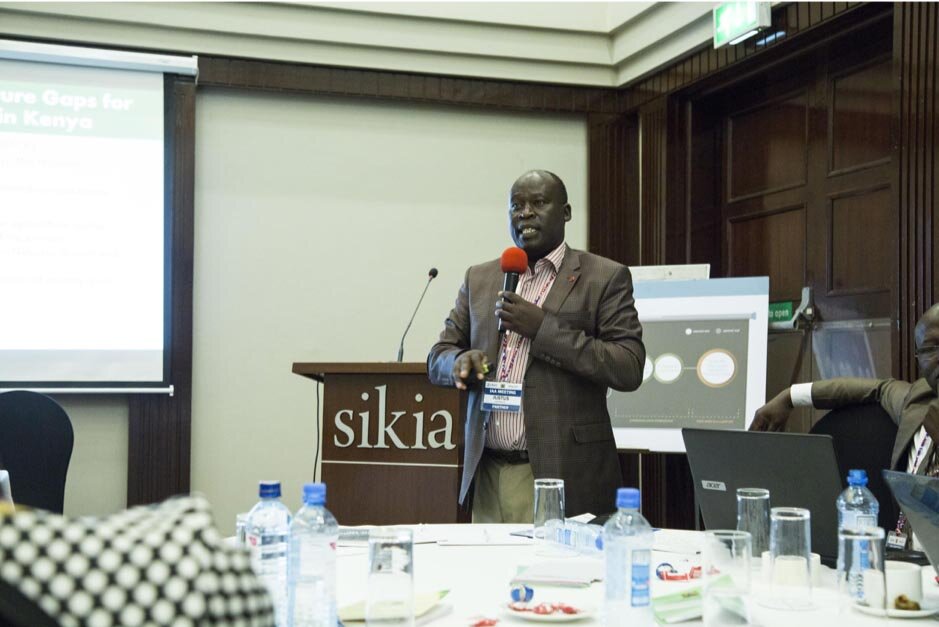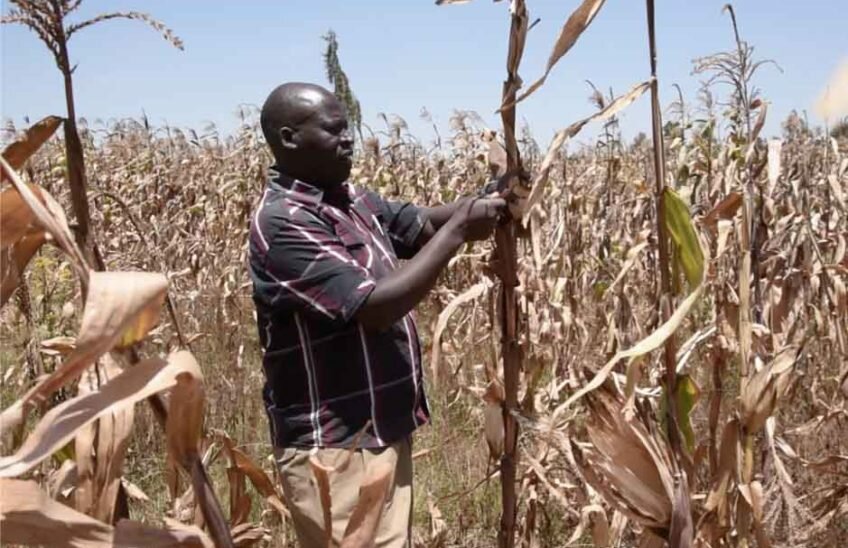Justus Monda walks through a dry, shrub-filled plot of land to meet his neighbors who have gathered to help him harvest this season’s maize. The field was once filled with pyrethrum flowers, but he’s had to turn to maize as his main crop due to poor yields and poor pyrethrum prices. Growing up in the fertile highlands of Southwestern Kenya famous for bananas, Justus was raised by crop-growing parents who always ensured they had enough food to eat, and some to sell to cover basic needs. After finishing his education, Justus moved to Kenya’s Central Rift Valley to work as a banker. It was here that he bought his first piece of land to venture into farming pyrethrum.
Thirty-two years later, Justus is now a leading advocate for farmers of all kinds as the chair of the Agriculture Council of Kenya (AGCK), an institution supported by USAID Kenya through Feed the Future’s Africa Lead program. As the second chair of the three year old organization, he credits all of the leaders and groups who came together to form the AGCK. AGCK was established in 2015 by six agriculture sector interest groups. Now the organization includes 10 apex organizations and 13 affiliate organizations, representing the interests of about 2.8 million individuals involved in agriculture across Kenya.
“AGCK is unique because it was formed by the leaders of Kenya’s many agriculture interest groups, to speak with one voice – farmers and producers, the private sector, extension services, academia and research, youth, women, agro-dealers. We see our interests as the same, to create a more food secure Kenya and to do it together,” says Justus.

Justus Monda harvests maize from his farm in Molo, Nakuru County. (photo credit: Victor Oloo/Africa Lead)
Justus, like many of his colleagues on AGCK’s Steering Committee, became a leader in Kenya’s agriculture sector because of the challenges he faced as a farmer. As a young farmer in the pyrethrum industry, he saw many ups and downs. In his early years, Justus enjoyed the great rewards of the little known crop; there was a ready market and farmers’ payments were always on time. In the years that followed, this “magical crop”, as he calls it, could no longer fetch meaningful returns. Prices dwindled and the lack of a proper regulatory body meant that middlemen could cripple profits. These experiences inspired him to be a voice for farmers’ issues and a more organized agriculture sector. In 2001 he formed the Kenya Pyrethrum Growers Association.
Over the years, millions of Kenya’s agriculturalists have had their needs represented by various interest groups, depending on their crop or business. And while there has been individual success for the various organizations, many of the organizations realized they lacked a unified voice to coordinate lobbying, advocacy and education efforts targeted at the various levels of government and agriculture planning. The result, he says, has been an agriculture sector that is failing to feed Kenyans like it fed him and his family since he was a child.
“It is a pity that 3.5 million people are staring at hunger. The government and line ministries are running up and down distributing food. It should not be the function of the government to supply food,” says Justus. “Food can be produced by the farmers, organized by the farmers, and distributed by the farmers themselves, given the right infrastructural arrangements.”
Justus is clear to point out that AGCK is not an organization for the leaders of agribusiness. Instead it seeks to represent the under-represented groups that make Kenya’s agriculture sector a major part of Kenya’s economy. Seventy-five percent of Kenyans derive all or part of their livelihoods from agriculture which also accounts for more than half of Kenya’s gross domestic product. Yet, small farmers and those who rely on agribusiness have to struggle to reach policy makers with their grievances and solutions to craft better policies. That’s why AGCK represents youth organizations, agro-dealers and processors, commodity associations, small and mid-size enterprises, marketers and producer organizations.
“Farmers’ problems at the grassroots level don’t seem to reach the decision makers at the top. We need a voice to take our plight and ideas to the national government for them to know our state as farmers,” says Steven Ndambuki, a farmer from Makueni County in Eastern Kenya, who is represented by Kenya’s Small Scale Farmers Federation, a member of AGCK’s National Steering Committee (NSC).
Africa Lead’s support came just as AGCK was beginning to take shape in 2016. As part of the program’s continental focus on supporting non-state actors’ engagement in agricultural policy dialogue, Africa Lead provided AGCK with technical support for organizational development and developing the structure of the organization. Africa Lead has recently supported AGCK through stakeholder consultations, and membership strategy and communication strategy development, all of which has enabled the organization to develop a new website hosting all of the organization’s materials and updates.
“It was important that Africa Lead supported AGCK because we came in when it was a very nascent organization that needed organizational and institutional strengthening for them to clearly understand the role of advocacy and to create their niche and space,” recounts Dorcas Mwakoi, Africa Lead’s former Kenya Program Lead.
Justus points out that Africa Lead’s support has not only helped the organization grow and become more stable, it has also linked AGCK to other non-state actors across Africa as a result of being linked with the Continental Non-State Actors Coalition (CNC), another Africa Lead partner. He also points out that the support has also helped to improve non-state actor engagement in Kenya’s participation in the Comprehensive Africa Agriculture Development Program (CAADP) and associated processes.

Justus Monda, Chairman of the Agriculture Council of Kenya gives a presentation at the IAA workshop in Nairobi, Kenya. (photo credit: Victor Oloo/Africa Lead)
“We now have space to sit around the president [of Kenya], what is referred to as the presidential roundtable, so that…issues that affect farmers at whatever level, they are picked from there,” says Justus.
With a growing membership and leadership structure made up of champions like Justus at the helm, the future looks bright for AGCK. More importantly, Justus and his colleagues know that they have now found their voice, their unified voice.
